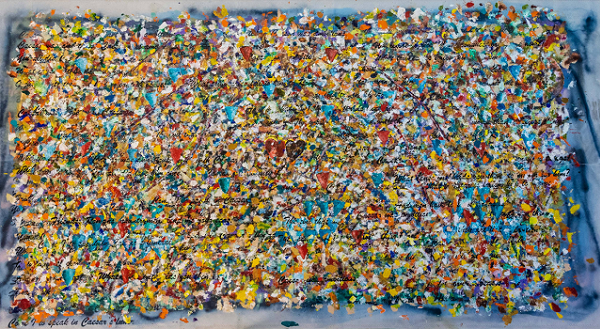
“Benoit’s Wonderfilled ‘Reflexion’” is a review of Grenadian visual artist and sociologist Oliver Benoit’s exhibition, “Reflexion”—part of Grenada’s 50th Independence anniversary celebrations and a retrospective of 30 years work. “Reflexion” is on view until April 30, 2024, at the St. Paul’s Community Centre in Grenada, where the multipurpose venue has been transformed into a site-specific and temporary gallery space simply called The Gallery. Benoit is one of the Grenadian exhibiting artists this year at the Venice Biennale. [The piece above, “Whipping the Mind,” is a work based on Carriacou’s Shakespeare Mas, which was featured in last year’s Venice Biennale.] Here is the full review by Adrian Augier:
I scroll back through unreeling image and muted sound to contemplate the art of Oliver Benoit. I find a necessary silence, an optimal distance, you might say, from which to absorb the under-spoken power of this artist’s work and being.
Sociologist, visual artist, raconteur, as many Caribbean artists must be, Benoit is engaged in an ancient vocation: recalling histories from the brink of amnesia. Reflexion is his latest assembled work, spanning thirty of his years, but timeless in its perspective. In this 50th year of Independence, the collection hangs proud and poignant in the transformed space of Saint Paul’s Community Centre, Grenada.
It is a special place, close to his heart, this community he left to seek the world, and to which he has since returned. Sculpted into hills high above Saint George’s, his panoply of paintings now speaks for him, issuing statements about persistence and continuity, and the need for creative sustenance within our Caribbean islands.
As venues go, this could be almost anywhere: cleanly cut, dressed and illuminated as any comparable gallery in London, Paris, Venice. Still, I wonder why I am here, neither priest nor prophet, preaching imperatives of history, politics, language and art, to elders who by now know all the many uncomfortable intrusions which interrupt our idyllic postcard existences.
Surrounded by Benoit’s work, I consider my own redundancy. I wonder how many will actually see this writing on our wall, and feel the intrinsic value of art and artists, even as our young nations turn blind, uncaring eyes upon themselves. I think this also haunts our Oliver. His work is driven by such abstract identities so desperately needed to shape our going forward.
These are his gifts to us: fruits and flowerings of hand and eye and consciousness, looking out from their expansive confines into the core of our human being. Their questions float on air, hoping to provoke and inspire. Like a sanctus dressed white and warmly lit, the Centre makes a timebound temple for his art. More bodies need to see this.
In the absence of suitable public spaces for such things, the backstory, as usual is: he did most of it himself. And in that same modesty he stands by his work, insistent, invested, stoic, and every much as dignified as his three dozen paintings punctuating the center’s incandescent walls.
The curation works well, curving its abstract chronology around the room. The storytelling spans powerfully, from deep cacao-colored, pre-columbian inspired panels, to brave monochromatic neutrals contemplating their own versions of anarchy.
Several powerful panels are devoted to explorations of Shakespeare Mas: a hybrid transcultural form unique to Benoit’s scattered islands. The pieces evoke both mas’ and memory, innovation as much as imitation, and learning lines by rote under threat of pain.
They also speak of this persistent magic our people share for transforming unsought obligation into celebration.
Finally, the broken bricks: a family of warm-toned abstracts which draw you in with their insistent scale and eloquent tone and texture. You will look at me, they say, and wonder how new pixelations can derive from crumbles of old brick.
They came first as transatlantic ballast, useful for building, until bulldozed and devalued. These bits of brick, collaged into new art, are syllables in a narrative of nonchalance: the ease with which we discard history, and disassemble our souls. No wonder, no lie, the precursory write-up to Reflexion speaks of a “hope-filled sadness which permeates” our region.
I recall a calm insistent iteration in these kinship pieces, as themes of slavery, colonialism, autonomy, and new discovery overlap and counter in guarded optimism. It is as if they too, are quietly engaging with themselves, about what is, and more so, what might be.
Fortunately for us, there are still artists like Oliver Benoit of Grenada, willing to gather our far flung and too oft’ forgotten fragments. We will long require them, to reassemble and re-arm us, to retell our stories, and teach us to become fiercer advocates of our own future good.
VAA/24.03.24
Dr. V. Adrian Augier is an award-winning poet, producer, Mas’ Man, and Caribbean Laureate of Arts and Letters. His creative work has appeared at numerous international festivals and expositions, including Expo Dubai (UAE), National Day Celebrations (Taipei), COP 21 (Paris), World Expo (S. Korea), Dublin Theater Festival (Ireland), Commonwealth Society (London), and Festival of Black Art and Culture (Dakar, Senegal).
He holds degrees in Economics, Political Science, and Development Finance and Planning, and has served as Economic Policy Advisor to the Prime Minister of Saint Lucia. In October 2012 he received an honorary doctorate from the University of the West Indies for his contribution to regional development and culture. In 2016 he received the St. Lucia Medal of Merit (Gold), and was appointed to serve as an Independent Senator in the Parliament of Saint Lucia.
For more on Oliver Benoit, see https://oliverbenoit.art/
For more on V. Adrian Augier, see https://www.peepaltreepress.com/authors/adrian-augier
“Benoit’s Wonderfilled ‘Reflexion’” is a review of Grenadian visual artist and sociologist Oliver Benoit’s exhibition, “Reflexion”—part of Grenada’s 50th Independence anniversary celebrations and a retrospective of 30 years work. “Reflexion” is on view until April 30, 2024, at the St. Paul’s Community Centre in Grenada, where the multipurpose venue has been transformed into a site-specific and







